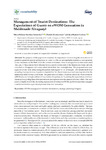Management of Tourist Destinations: the Expectations of Guests on eWOM Generation in Maldonado (Uruguay)

Ver/
Use este enlace para citar
http://hdl.handle.net/2183/26399
A non ser que se indique outra cousa, a licenza do ítem descríbese como Atribución 4.0 Internacional
Coleccións
- GI-GREFIN - Artigos [75]
Metadatos
Mostrar o rexistro completo do ítemTítulo
Management of Tourist Destinations: the Expectations of Guests on eWOM Generation in Maldonado (Uruguay)Data
2020Cita bibliográfica
Sánchez-Fernández, M.D., Alvarez-Bassi, D. & Ramón Cardona, J. Management of Tourist Destinations: The Expectations of Guests on eWOM Generation in Maldonado (Uruguay). Sustainability, 12 (17), 1-18. doi:10.3390/su12176825
Resumo
[Abstract] The purpose of this paper is to examine the importance of exceeding the expectations of
guests to generate greater satisfaction, in order to offer an unforgettable experience and generate
more comments on the Web 2.0 in the context of tourism. Structural equation models were used.
The data for the analysis were obtained from a sample of residents of the Maldonado-Punta del Este
conurbation (Uruguay), who were asked about their last overnight stay. The proposed structural
equation model was tested using the partial least square (PLS) technique. The results show that
exceeding the expectations of guests is essential for the clients’ experience and very important for the
satisfaction with the stay at the hotel. The generation of online comments (electronic word-of-mouth
(eWOM)) is also strongly influenced by emotional experiences. Exceeding the expectations of trained
clients and surprising them with new services and experiences is the essence of luxury offers. The main
practical implication is that exceeding expectations is the key to eWOM, and this means that managers
must be involved in a perpetual process of service innovation.
Palabras chave
eWOM
Management of tourist destinations
Strategic planning
Uruguay
Management of tourist destinations
Strategic planning
Uruguay
Versión do editor
Dereitos
Atribución 4.0 Internacional
ISSN
2071-1050






